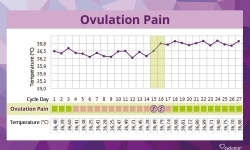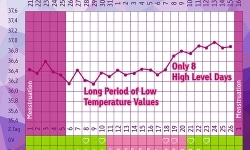Was Du auf dieser Seite findest:
What Can He Do to Improve His Sperm Quality?
A healthy diet, weight loss and frequent intercourse – there is a large number of books and websites with tips on how to improve the quality of your sperms. Unfit sperms have an effect on the chances of becoming pregnant. In order to have a baby, it is important that there is a large number of motile, normally shaped sperms. What ways are there to boost the quality?
A Healthy Diet
Many men and couples wonder what he can do for his sperms and how to boost fertility. Taking care of your health by eating foods which are rich in antioxidants and vitamin C and E are presumed to improve sperm quality. Especially vitamin C is known to boost fertility.1 Vitamin D is presumed to have a positive effect, too. Small parts of it is supplied by our food intake but is mostly produced due to natural sunlight on our skin. During winter, our skin often doesn’t get enough sunlight in order to produce vitamin D sufficiently. That’s why a vitamin D deficiency is very common.2 Zinc, folic acid, coenzyme Q10 as well as selenium can improve the sperm quality.3 Amino acids like L-carnitine are also assumed to boost male fertility.4
A study conducted on 80 men at the age of 20 to 80 in 2012 examined whether vital substances and micro nutrients could boost the quality of sperms. The result was that the sperms of men taking vitamin C, E, zinc and folic acid were less affected by DNA damage. Together with selenium, they can contribute to a better sperm quality.5 Another study from the Royal Victoria Hospital in Belfast concluded that soy products might have a negative effect on the quality of sperms, as they could have an oestrogen-like effect.6
What foods contain these recommended vitamins, micro nutrients and amino acids?
Vitamin C, Vitamin D and Vitamin E
Our body can’t produce vitamin C on its own, so it has to be taken in through our diet. Many vegetables and fruits like cauliflower, broccoli, pepper as well as oranges, goji berries, grapefruits and kiwis are rich in these nutrients.
The supply of vitamin D through food, e.g. fish, egg, milk and butter, is not enough. According to the German Nutrition Society (DGE), it is not possible to obtain a sufficient vitamin D level by eating healthy. It can only be reached through sunlight and/or a vitamin D supplement.7
Nuts and high-quality vegetable oils like canola, sunflower, olive or coconut contain vitamin E.
Folic Acid, Zinc, Coenzyme Q10 and Selenium
Folic acid is to be found in a variety of foods, e.g. liver, legumes like beans or peas, cereal products, vegetables like spinach, green and white cabbage, but also in fruits, nuts and seeds.
Zinc can be found in protein-rich foods, e.g. cheese, meat, pumpkin seeds, linseeds, fish, seafood, egg, whole-grain products, legumes, ginger and mushrooms.3
Vegetable oils, onions, lettuce, cabbage and raw spinach, meat, fish and nuts contain the coenzyme Q10. Sunflower seeds, coconut flakes and fish as well as Brazil nuts are rich in selenium.
L-Carnitine
Especially meat, fish, poultry and dairy products are rich in L-carnitine. Fruits and vegetables, on the other hand, contain rather little of it.
Frequent Intercourse?
Most experts assume that the quality as well as quantity of sperms are best if a couple has sex every day to every 3 days. Longer breaks are supposed to have a negative effect on the fertility of sperm cells, shorter breaks are likely to lead to a reduced concentration of sperms.8
Does the Age of a Man Play a Decisive Role?
A man’s age is generally an important factor. Quantity, quality and motility of sperms decline with the age. Apart from that, the body’s ability to protect itself from oxidative stress and free radicals can damage the genetic constitution of sperms in the testicles with increasing age.3
However, it is presumed that the fertility and quality of sperms are less affected by the age than it is the case for the fertility of women.3 Furthermore, a study concluded that men older than 44 dispose of the same sperm quality as younger men (20 to 44) if they supplemented their diet with vitamin C, E and zinc.1
Caution: What Men Should Avoid!
In order to guarantee a sufficient production of sperms, there are a few things men should know and avoid when they are planning a child. There are many sperm killers due to a wrong lifestyle.
No Nicotine, Little Coffee and Alcohol
Several studies confirmed that smoking has a negative effect on the quality, quantity and motility of sperms. In addition to that, there are indications that the risk of a complicated pregnancy, e.g. a miscarriage, rises due to the damaged genetic constitution.9.10
A Brazilian study found out that moderate coffee consumption leads to an improvement of sperm quality.11 However, American scientists discovered that 3 cups of coffee a day could already lower the quality as well as quantity of sperms.12
Alcohol can also be an important factor. According to a Danish study even moderate alcohol consumption can impair the fertility and sperm quality rather quickly.13
Watch Your Weight
His weight can also have an influence on sperms. According to an investigation of the Syddansk Universitet in Odense, where 1558 men with an average age of 19 were examined, overweight reduces the sperm concentration by 24% compared to normal weight.14 It is presumed that overweight has a negative effect on the hormone production in the testicles.
Regular exercising boosts the production of testosterone and sperms.15 However, if he is planning to lose weight, it is important not to overdo it. Extreme athletes who do a lot of cardio training reduce their sperm quality and the fertility of their sperm cells on the long term.16
Sperm Booster for Better Sperm Quality
Boost your sperms. It sounds funny in the beginning. For those who are affected it is not so much. If sperms are slow, malformed or the concentration is low, this might be the reason for infertility and an unfulfilled wish for a child.1 Scientists discovered that the sperm motility, quantity and quality of men in Germany has been declining for some time now.17
It is actually possible to improve the quality and quantity by following the advice and tips mentioned. If you are planning for a baby, it is recommendable to check your lifestyle habits in order to boost sperm quality and lifespan. The lifespan of sperms has a significant influence on the likelihood of a pregnancy, too.
Sources:
1 Ross C. et al.: A systematic review of the effect of oral antioxidants on male infertility. Reproductive Biomedicine Online. Jun;20(6):711-723. 2010.
2 Lerchbaum, E. and Obermayer-Pietsch, B.: Vitamin D and fertility: a systematic review. European Journal of Endocrinology. Volume 166, Issue 5, (S. 765-78). 2012.
3 Gnoth, C. und Noll, A.: Kinderwunsch – Natürliche Wege zum Wunschkind. Munich 2009.
4 Lenzi, A. et al.: Use of carnitine therapy in selected cases of male factor infertility: a double-blind crossover trial. Fertil Steril. Feb;79(2):292-300. 2003.
5 Schmid, Th. et al.: Micronutrients intake is associated with improved sperm DNA quality in older men, Fertility and Sterility, Vol. 98. 2012.
6 West, M. C. et al.: Dietary oestrogens and male fertility potential. Human Fertility, Vol. 8. 2005.
7 Gesellschaften für Ernährung in Deutschland (DGE), Österreich (ÖGE) und der Schweiz (SGE): Referenzwerte für die Nährstoffzufuhr. 2nd edition. 2015.
8 Levitas, E. et al.: Relationship between the duration of sexual abstinence and semen quality: analysis of 9.489 semen samples. Fertility and Sterility, Vol. 83. 2005.
9 Künzle, R. et al.: Semen quality of male smokers and nonsmokers in infertile couples. Fertility and Sterility, Vol. 79. 2003.
10 Chia S. E. et al.: Factors associated with male infertility: a case-control study of 218 infertile and 240 fertile men. BJOG, Vol. 107. 2000.
11 Sobreiro B. P. et al.: Semen analysis in fertile patients undergoing vasectomy: reference values and variations according to age, length of sexual abstinence, seasonality, smoking habits and caffeine intake. Sao Paulo Med. 123(4):161-166. 2005.
12 Schmid, T. E. et al: The effects of male age on sperm DNA damage in healthy non-smokers. Human Reproduction. Vol. 22, Issue 1, p. 180-187. 2006.
13 Jensen, K. et al.: Habitual alcohol consumption associated with reduced semen quality and changes in reproductive hormones; a cross-sectional study Amor 1221 young Danish men. BMJ Open. 2014.
14 Jensen, T. K. et al: Body mass index in relation to semen quality and reproductive hormones among 1558 Danish men. Fertilität and Sterilität, Vol. 82. 2004.
15 Vaamonde, D. et al.: Physically active men show better semen parameters and hormone values than sedentary men. European Journal of Applied Physiology, Vol. 112. 2012.
16 Vaamonde, D. et al: Response of semen parameters to three training modalities. Fertility Sterility, Vol. 92. 2009.
17 Jacobi, H.: Rückgang der Spermienqualität in Deutschland und Europa. Bremen. 1999.




